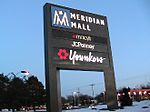Lake Lansing Park North
Lake Lansing Park North is a public park in Haslett, Michigan covering over 530 acres (0.83 sq mi). The park covers a variety of ecosystems, including mature oak and maple woodlands, marshlands, pine plantations and transitional field areas. The park entrance is located at 6260 East Lake Drive across from the Lake Lansing boat launch. There are several trails for hiking in the spring, summer and fall months, and cross country skiing in the winter. There is a per vehicle entrance fee year-round of $3 for Ingham County residents and $5 for non-residents seven days a week. Annual passes are available for $35 for Ingham County residents and $45 for non-Ingham County residents. Park North was completed in 1986 as part of a rejuvenation project on the Lake Lansing area, starting when Lake Lansing Park South, a sister park across the lake consisting mainly of a beach and picnic grounds, was purchased by Ingham County in 1974. According to the Ingham County Parks Department, roughly 450,000 people visit the Lake Lansing parks a year, with over 90% coming from the Lansing metropolitan area.
Excerpt from the Wikipedia article Lake Lansing Park North (License: CC BY-SA 3.0, Authors).Lake Lansing Park North
Lake Lansing Park North,
Geographical coordinates (GPS) Address Nearby Places Show on map
Geographical coordinates (GPS)
| Latitude | Longitude |
|---|---|
| N 42.76874 ° | E -84.39223 ° |
Address
Lake Lansing Park North
Lake Lansing Park North
48840 , Haslett
Michigan, United States
Open on Google Maps










